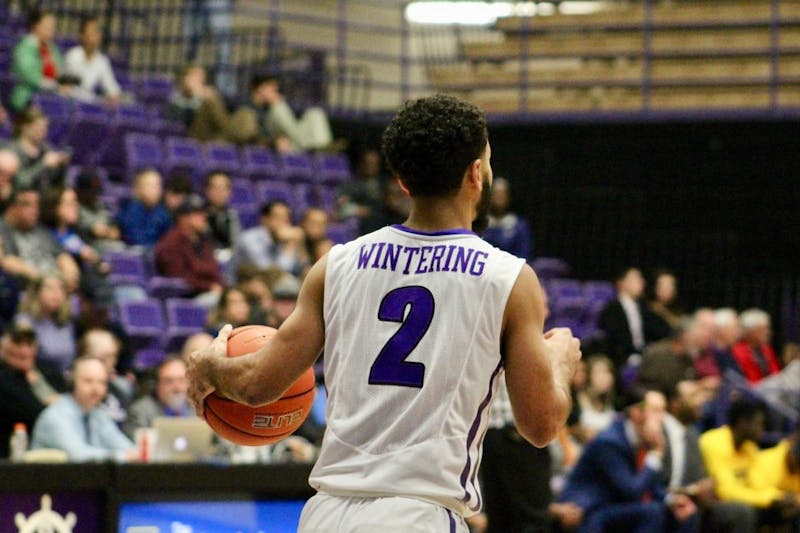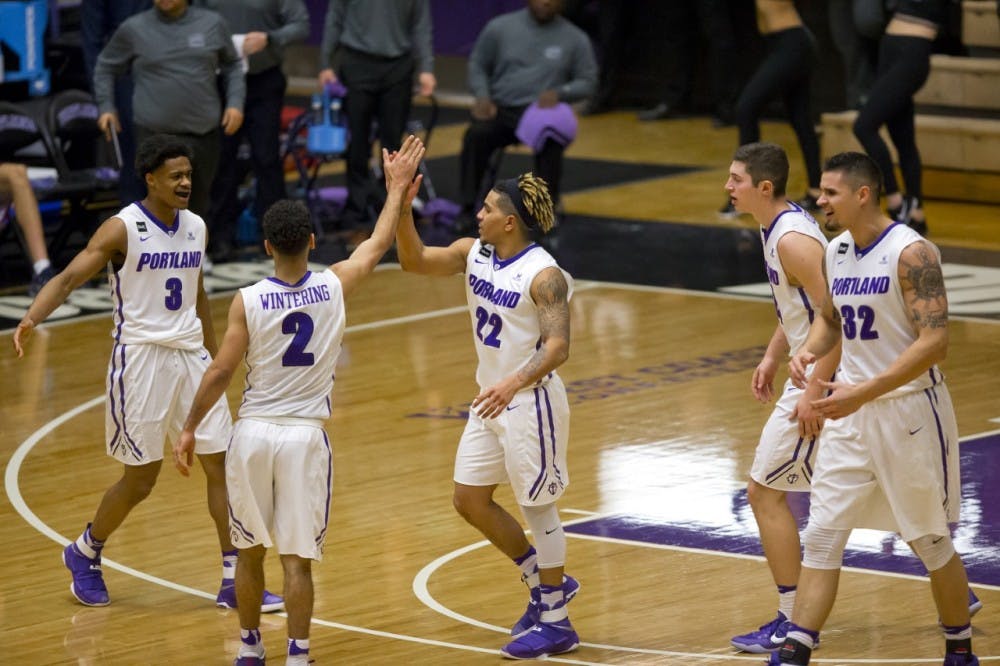Rewind: It’s Thanksgiving break and the University of Portland men’s basketball team is in Southern California for the Wooden Legacy tournament. The Pilots are playing Cal State Northridge in the consolation bracket after dropping their first two games. And guards Alec Wintering and Jazz Johnson quickly take over.
Early in the first half, Johnson finds himself open at the top of the arc off a screen. He pulls up.
Bang.
Johnson accelerates down the left lane three minutes later. A double team greets him at the rim, so he whips a left-handed pass to an open Wintering behind the arc on the right wing.
Wintering launches. Splash.
And late in the second half, Johnson again finds his backcourt running mate wide open. He’s in the corner this time, but it reaps the same result: a swish. The two combined for 62 points-- the most points by a Portland pair in the same game in school history. Wintering and Johnson both had career-highs with 36 and 26 points, respectively.
But they’re small by Division I basketball standards. In a game where the average height is well over six feet, the 5-foot-10 Wintering and 5-foot-9 Johnson are oddities. Sure, it’s becoming more common with guards like Kyle Lowry and Isaiah Thomas making NBA headlines, but the NCAA and the West Coast Conference are different animals. What Portland’s duo lacks in inches, they make up for on the court.

They use speed to punish defenders and as a result, are the fifth highest scoring backcourt in the country and ninth highest duo overall, averaging a combined 37.4 points per game.
“It’s all about heart…. Not caring about how tall you are,” Johnson told The Beacon. “Basketball is basketball at the end of the day.”
Johnson has quickly squashed any uncertainty on the offensive side of the ball that came with Bryce Pressley’s departure. The sophomore guard has transitioned from a reserve role as a freshman to Wintering’s co-star in the backcourt, pouring in 17.3 points per contest — fifth best in the WCC — more than 2.5 times his average from last year.
Wintering, a first-team all-conference selection as a junior, has racked up achievements worthy of national recognition this season. It’s a mouthful: Third among all active players in Division I in assists with 565. Top 50 in the nation in points, assists, steals and minutes per game -- Third, second, second and first in the four categories in the WCC, respectively. Conference player of the week and National Mid-Major player of the week honors to his name. He’s also fifth on Portland’s all-time scoring list, second in steals and is on pace to become the program’s all-time assists leader.
And together, Wintering and Johnson are the motor of the Pilots’ new-look system under first-year head coach Terry Porter. So sitting at 9-8, and riding a three-game losing streak for the first time this season, Portland will look to their backcourt tandem to get the team back on track.
“They’ve got a pretty good chemistry going on right now,” first-year assistant coach Ben Johnson said. “Obviously, we’re playing off that right now. They’re our two strongest players so we want to continue to go down that route.”
UNDERRATED
A small guard never truly vanquishes his skeptics.
No matter how effective the little guy is on the court, he’s told that he lacks the physical gifts and size to stand out. Players under six feet have to fight for their place in a basketball world that values height and ‘potential’— which often go hand-in-hand — not production.
Cleveland Cavaliers’ 5-foot-9 rookie point guard Kay Felder was the 54th pick in last year’s NBA draft — the seventh-to-last player chosen — despite leading college basketball in assists and being fourth in scoring. 5-foot-9 Thomas, on the verge of his second straight All-Star selection with the Boston Celtics, was the last pick in the 2011 draft.
Like Felder and Thomas, Johnson has never had the look of an ideal basketball player. He didn’t have the height or body shape. Johnson’s father, Leland, started training him at 7-years-old. Jazz recalls a lot of his teammates’ parents used to ask Leland why he would work his son so hard.
“My dad says that they would say, ‘What is he (Leland) gonna to do with this short, fat kid?’” Johnson said.
And he wasn’t spared by his peers. They made fun of him for being overweight. After being called fat at school, he’d go to his parents for comfort. But he used those comments to fuel him and eventually, he spun it into confidence.

Johnson would go on to average more than 20 points per game his junior and senior year of high school — highlighted by a 44-point outburst against the nation’s No. 1 team in 2014, which featured the top pick in last year’s draft, Ben Simmons.
“A lot of people have slept on me for so long,” Johnson said. “It’s just a fire within me. I want to prove to everyone that I work hard and I have the ability to be elite.”
Wintering, a four-year starter for Portland, is quick to brush off talk of his height being a disadvantage for him on the court. He points out his advantages over bigger guards: “They’re not gonna go up against someone as quick as me or as skilled as me on a daily basis,” he says. But he does feel overlooked, and attributes how he is perceived to his small stature.
Growing up, Wintering always played with older kids two age groups. He was looked down on because of his height. Today, as the Pilots’ undisputed leader, he plays with the same chip on his shoulder. And more fuel was added to his fire early this season: He was left off the all-tournament team at the Wooden Legacy despite leading the tournament in scoring.
But Wintering accepts his reality with the maturity of an experienced senior. He doesn’t complain. He’s motivated by players that get more of the spotlight — players with just a few inches on him. But he’s confident that his body of work will be recognized in due time.
“If they keep just writing me off, I’m gonna keep pushing away and doing my thing,” Wintering told The Beacon. “It’s gonna make me better in the long-run.”
PORTLAND’S LEADERS
Porter’s NBA-style offense, packed with pick-and-rolls and motion action, has allowed Portland’s guard play to thrive. The floor is more open for Johnson and Wintering to operate. They have the freedom to create shots for themselves and their teammates. And Porter trusts both to improvise at the end of the shot clock — to pull the ball out to the top of the key and call for a screen to make something happen.
This trust has helped Johnson to flourish this season.
As a freshman, he questioned how good he could be at the college level. Some games, he’d play 20 minutes off the bench, but in others, he’d see just eight. Porter has given Johnson the green light in a starting role as a sophomore.
“I really do thank coach Porter for believing in me,” Johnson said. “He’s helped my confidence in terms of giving me a chance and in the early stages, allowing me to make mistakes.”
But with more trust comes greater responsibility.
As Portland’s only playmakers, Wintering and Johnson don’t get much rest. Both average more than 35 minutes per game. Wintering hasn’t left the court in 10 of the the Pilots’ 17 games so far this season. So the coaching staff gives the tandem — as well as junior forward Gabe Taylor, another heavy minute-logger — the occasional day-off from practice to avoid burnout.
Even with their impressive production come game time, it isn’t smooth sailing. The Pilots are struggling. The three-game skid is the team’s worst stretch to date in Porter’s first year as head coach; The 41-point loss to No. 23 Saint Mary’s at home on ESPNU, a wake-up call.
“We’d like to try and get them a few minutes of rest if possible in games, but we are going to continue to rely on them to play big minutes,” Porter said in an email. “They make us go and we need them on the court.”
So Portland’s engine won’t stop: it keeps chugging along.

Johnson’s transformed body has allowed him to take on the added mileage. Off-season workouts with his dad last summer included more conditioning, and since arriving on the Bluff at a bulky 215 pounds, he’s slimmed to 192. And he’s been more conscious of his diet, too, limiting consumption of fried foods and his favorite candies, Reese's and Butterfingers.
The added minutes were an adjustment for Johnson, but for Wintering it’s a similar burden. He floated around 30 minutes per game the last two seasons.
Former conditioning coach Bradford Scott used to joke that Wintering was a hummingbird who could carry on a full conversation while running a four minute mile. Maybe he gets that from his older brother, Daniel Wintering-- a former Division III player and grad assistant for the Pac-12’s Arizona State and USC. Compared to workouts with him last summer, which Wintering says were the hardest he’s ever been through, playing a full game is a breeze. He internalized his brother’s “You have to be a machine” message.
“(Wintering and I) know at the end of the day, we have to be the two that are driving the car,” Johnson said.
DUAL THREAT
The tandem’s chemistry begins off the court.
It’s a big brother-little brother relationship. Laughter and light-hearted jokes fill the air when they’re together. Johnson goes over to Wintering’s apartment in Tyson hall — which he shares with six other teammates — so they can watch college basketball. When it’s power conference schools playing, it’s the same thought-provoking questions: How would we match up? Could we actually beat them?
The atmosphere is laid back. Conversation stays loose. But the flip switches when they hit the hardwood: Big brother and little brother lock in.

Johnson becomes a sponge around his elder statesman. Wintering teaches him the nuances of the game: playing the pick-and-roll, finding teammates in the offense and where to be on defense.
When it’s game time, and they need to help their team score, the dialogue between them is short and to the point: ‘Be aggressive.’
And they’ll play to their strengths. Johnson will spread the defense with his jump shot. Wintering will use his speed to get to the paint to create for himself or teammates. They’ll take turns jabbing at the defense.
They’re the perfect complement to each other, but can be a nightmare for opposing teams.
“Either help off of him (Johnson), and I get a bucket, or come help on me, he gets a bucket,” Wintering said.
The team’s record may not show it, but Porter’s system is tailor-made for its diminutive backcourt tandem.
So pick your poison. They’re the 1-2 punch that you didn’t see coming up the road.









